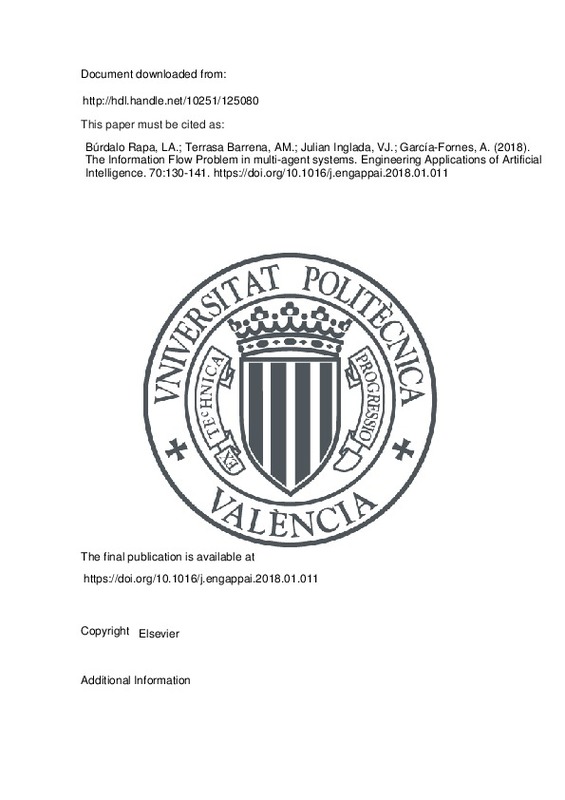JavaScript is disabled for your browser. Some features of this site may not work without it.
Buscar en RiuNet
Listar
Mi cuenta
Estadísticas
Ayuda RiuNet
Admin. UPV
The Information Flow Problem in multi-agent systems
Mostrar el registro sencillo del ítem
Ficheros en el ítem
| dc.contributor.author | Búrdalo Rapa, Luis Antonio
|
es_ES |
| dc.contributor.author | Terrasa Barrena, Andrés Martín
|
es_ES |
| dc.contributor.author | Julian Inglada, Vicente Javier
|
es_ES |
| dc.contributor.author | García-Fornes, A
|
es_ES |
| dc.date.accessioned | 2019-09-05T20:03:34Z | |
| dc.date.available | 2019-09-05T20:03:34Z | |
| dc.date.issued | 2018 | es_ES |
| dc.identifier.issn | 0952-1976 | es_ES |
| dc.identifier.uri | http://hdl.handle.net/10251/125080 | |
| dc.description.abstract | [EN] One of the problems related to the multi-agent systems area is the adequate exchange of information within the system. This problem is not only related to the availability of highly efficient and sophisticated message-passing mechanisms, which are in fact provided with by current multi-agent platforms, but also to the election of an appropriate communication strategy, which may also greatly influence the ability of the system to cope with the exchange of large amounts of data. Ideally, the communication strategy should be compatible with how the information flows in the system, that is, how agents share their knowledge with each other in order to fulfill the system-level goals. In this way, MAS designers must deal with the problem of analyzing the multi-agent system with respect the communication strategy that best suits the way the information flows in that particular system. This paper presents a formalization of this problem, which has been coined as the Information Flow Problem, and also presents a complete case study with an empirical evaluation involving four well-known communication strategies and eight typical multi-agent systems. | es_ES |
| dc.description.sponsorship | This work was partially supported by MINECO/FEDER TIN2015-65515-C4-1-R and TIN2014-55206-R of the Spanish government. | es_ES |
| dc.language | Inglés | es_ES |
| dc.publisher | Elsevier | es_ES |
| dc.relation.ispartof | Engineering Applications of Artificial Intelligence | es_ES |
| dc.rights | Reconocimiento - No comercial - Sin obra derivada (by-nc-nd) | es_ES |
| dc.subject | Multi-agent systems | es_ES |
| dc.subject | Communication strategies | es_ES |
| dc.subject | Agent communication | es_ES |
| dc.subject | Information exchange | es_ES |
| dc.subject.classification | LENGUAJES Y SISTEMAS INFORMATICOS | es_ES |
| dc.title | The Information Flow Problem in multi-agent systems | es_ES |
| dc.type | Artículo | es_ES |
| dc.identifier.doi | 10.1016/j.engappai.2018.01.011 | es_ES |
| dc.relation.projectID | info:eu-repo/grantAgreement/MINECO//TIN2014-55206-R/ES/PRIVACIDAD EN ENTORNOS SOCIALES EDUCATIVOS DURANTE LA INFANCIA Y LA ADOLESCENCIA/ | es_ES |
| dc.relation.projectID | info:eu-repo/grantAgreement/MINECO//TIN2015-65515-C4-1-R/ES/ARQUITECTURA PERSUASIVA PARA EL USO SOSTENIBLE E INTELIGENTE DE VEHICULOS EN FLOTAS URBANAS/ | es_ES |
| dc.rights.accessRights | Abierto | es_ES |
| dc.contributor.affiliation | Universitat Politècnica de València. Departamento de Sistemas Informáticos y Computación - Departament de Sistemes Informàtics i Computació | es_ES |
| dc.description.bibliographicCitation | Búrdalo Rapa, LA.; Terrasa Barrena, AM.; Julian Inglada, VJ.; García-Fornes, A. (2018). The Information Flow Problem in multi-agent systems. Engineering Applications of Artificial Intelligence. 70:130-141. https://doi.org/10.1016/j.engappai.2018.01.011 | es_ES |
| dc.description.accrualMethod | S | es_ES |
| dc.relation.publisherversion | https://doi.org/10.1016/j.engappai.2018.01.011 | es_ES |
| dc.description.upvformatpinicio | 130 | es_ES |
| dc.description.upvformatpfin | 141 | es_ES |
| dc.type.version | info:eu-repo/semantics/publishedVersion | es_ES |
| dc.description.volume | 70 | es_ES |
| dc.relation.pasarela | S\352309 | es_ES |
| dc.contributor.funder | Ministerio de Economía y Empresa | es_ES |







![[Cerrado]](/themes/UPV/images/candado.png)

